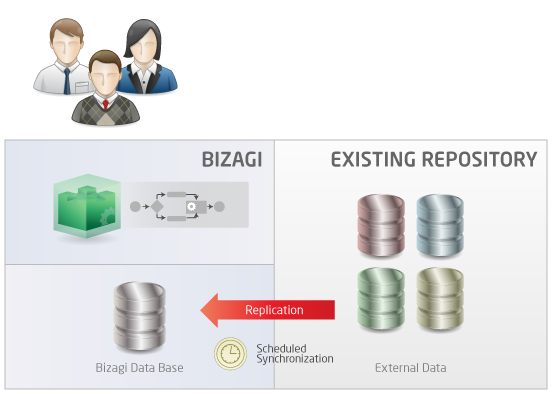Replication
From Business Process Management, BPM and Workflow Automation Wiki | BizAgi BPMS
<keywords content="keywords"> replicate, synchronize entities, parameter, lists, parametric, combo, combos, combobox </keywords>
Contents |
Replication
Overview
Replication of entities in Bizagi is a data-level integration mechanism. Throughout this approach, Bizagi synchronizes the values of parameter entities with information residing in another data source within the organization.
This feature will keep an updated copy of the information stored in a table from any external system. This way, this external system is set as the only administrative and entry point for lists and records from entities which are not transactional.
With replication and its settings, Bizagi can synchronize its entities with the source's information periodically (as a scheduled task).
This means that this job itself of updating, inserting or disabling records in parameter entities of Bizagi's data model, may be carried out as a daily, weekly or monthly task. Once an entity is replicated in Bizagi, its values management is not done directly from Bizagi's work portal.
The following image illustrates this concept:
Replication configuration
Configuring replication in Bizagi is done through an assisted graphical wizard. This wizard allows the definition and settings for the data provider's connection to Oracle or SQL Server databases. This is done in easy steps, without the need of programming.
If a project does require replication against a different data source (other than Oracle or SQL Server) such as MySQL, XML files, Microsoft Access, etc, then it is possible to include a custom implementation to override Bizagi's layer and methods executing the replication.
|
Note: The feature and possibility to include a custom implementation to virtualize against different data sources (than Oracle or SQL Server) is supported in Bizagi Enterprise .Net edition. |
Considerations
In sophisticated scenarios in which replication is required for a set of tables which are related to each other (or have a relationship with virtualized entities), all of these tables should be replicated. This is in order to ensure that the data synchronization performed by Bizagi, can maintain the referential integrity in this information.
For example, when replicating a "City" table having a relationship with a "Country" table, both tables should be replicated.
Replication applies only for parameter entities in Bizagi (those entities which have list values for information selected frequently in comboboxes). Replication does not apply for transactional tables. For transactional tables' data integration (called master entities in Bizagi), refer to virtualization.
Bizagi in its graphical wizard supports the configuration and connection to the following database versions. The supported versions of MSSQL and Oracle are: MSSQL 2000, 2005, 2008 and Oracle 9i, 10g R2, 11g R1, 11g R2.
|
Note: When replicating entities against an Oracle database, to use Bizagi's graphical wizard it is required to install Oracle Data Provider for .Net. |
Enterprise JEE consideration
To configure virtualization or replication in a Test or Production environment using a JEE Application server (applies for Bizagi Enterprise JEE edition), an additional step is needed so that the external data source is configured at the Application server's level.
To carry out this step, ensure that your JEE Application server is already configured to work with Bizagi.
Take into account that this step is only needed in an environment different than the Development environment (in which case, Bizagi Studio automatically configures the JBoss 7.1.1 Application server's data source).
View How to configure virtualization and replication in a JEE Application server.
Further information about Replication and virtualization
- How to Replicate an Entity: Wizard Method.
- Standard Method.
- Replication for data sources different from MSSQL and Oracle.
- Data Type Support
- Bizagi's virtualization.
Related Articles
<comments />

